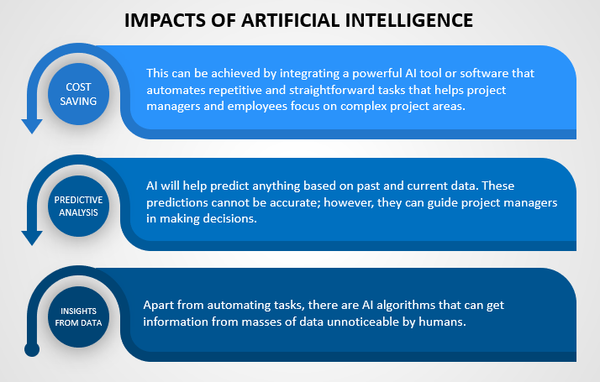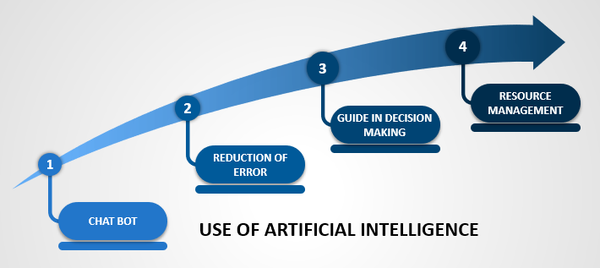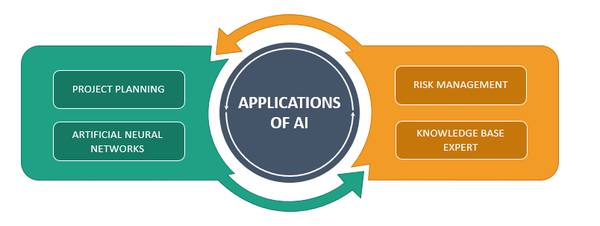Artificial Intelligence - What are the Impacts and Applications of Artificial Intelligence?
What Is Artificial Intelligence?
Artificial intelligence, also known as AI, refers to the idea of building machines that can perform tasks that would normally require human intelligence. It has been applied to many different fields, such as computer science and robotics. Artificial intelligence is a broad term that refers to any device or computer system capable of performing tasks that require intelligent behavior. Artificial intelligence is a trending topic today. It's been a popular concept in science fiction for decades, but it has recently become an essential part of the modern world.

AI is now considered to be one of the most important innovations in the last century and continues to develop in revolutionary ways. AI can be found in many different forms such as expert systems, chatbots, autonomous vehicles, and machine learning.
Impact Of AI On Project Management:

Artificial Intelligence is a fascinating field of study that has many implications for project managers. The world of project management is changing, and AI is playing a big part. We will discuss some impacts of AI on project management.
- Cost-saving - This can be achieved by integrating a powerful AI tool or software that automates repetitive and straightforward tasks that helps project managers and employees focus on complex project areas. This will improve the quality of work and reduce the timeframe to accomplish the project. It also reduces the labor cost incurred by an employer, which is one of the main reasons for its adoption.
- Predictive analysis - AI will help predict anything based on past and current data. These predictions cannot be accurate; however, they can guide project managers in making decisions. It also gives warnings if the project is not going according to the plan, saving time and budget in the long run.
- Insights from data - Apart from automating tasks, there are AI algorithms that can get information from masses of data unnoticeable by humans. AI provides insights from multiple aspects that solve complex problems of the company and guides managers to make smarter decisions.
How Is AI Different From Relying On Project Managers?
It is estimated that by 2030 AI will change project management and the role of project managers in the future. According to Gartner says 80% of today's project management tasks will be eliminated and predicts there will be a requirement of 88 million employees to work in project management by 2027. AI and project managers can work together but not separately. Tasks like predictive estimation can be done better by AI, but AI tools rely on data input from project managers. Without their expertise, AI algorithms will not function to their best capacity. A machine learning model provides the best conclusions based on the data it is trained on, and we need the domain knowledge of a project manager to provide the quality data.
How Can Artificial Intelligence Help Project Managers?
Project managers are always looking for ways to make their jobs easier. And because they have so much responsibility, project managers often need to juggle many different tasks at once.
Here are the following ways how AI can help a manager in managing project deliveries:

- Chatbot assistants - Chatbots can play a vital role in helping project managers with their workload by helping generate reports, scheduling meetings, taking notes, and more. A project manager must monitor the execution of projects, organize tasks, and avoid any obstacles. Chatbots also provide employees with accurate information and timely updates to avoid falling behind or getting delayed.
- Reduction of errors - The prediction and reduction of errors are crucial to ensure quality project delivery. AI models can track the progress, compare it with the planned schedule, alert the manager in case of underperformance, and even provide recommendations to make any changes.
- Guide in decision making - As many organizations are shifting towards data-driven decisions, AI can guide a project manager in making more intelligent decisions based on the large volume of data. AI can identify the critical performance metrics of a project, create visualizations, and help develop new ideas.
- Resource management - To ensure success in your projects, you need to form the best team of resources to work on them. AI tracks the previous achievements of each resource, shortlists the deserved ones, and assigns them roles and responsibilities based on their skills. AI also helps newly joined staff access training material, allowing them to upgrade with the new trends. This saves time taken to onboard them on new projects.
The Applications Of AI In Project Management:

- Project planning - Irrespective of the project size and industry, a project manager strives to deliver the project with time and budget. This can be accomplished by effective project planning. AI tools automate many activities like formulating a budget plan, creating a risk management plan, and allocating resources.
- Risk management - AI models predict the risk involved before the project starts and provide recommendations to deal with them to reduce the threat to the project. For example, financial institutions and credit card companies, with the help of machine learning algorithms, can make predictions about the likelihood of fraud with greater precision than ever before.
- KBE - Knowledge-based expert systems are computer programs that emulate human expertise in a specific domain by applying logical inference rules on facts stored in knowledge bases or databases. These systems take information from databases and use it to the decision at hand, making them an invaluable tool in any industry. One of the most important benefits is its ability to provide users with more accurate and reliable advice than traditional systems, such as search engines.
- ANN - ANNs is a system that has been modelled after the human brain to learn from data. They are typically used in machine learning applications to predict future patterns, but they can also be applied to project management and scheduling. ANN indicates the cost overruns, estimation, risks involved, and chances of winning bids.



